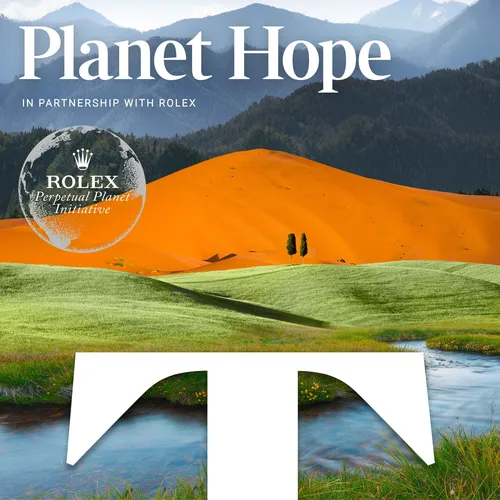
Planet Hope
Rising temperatures and extreme weather have become the new normal - but all is not lost.
In this podcast series about finding hope on a changing planet, The Times's Environment Editor Adam Vaughan sets out to understand what exactly is happening to the world around us and meets the experts trying to hold back the tide.
Planet Hope is a podcast from The Times and The Sunday Times in partnership with Rolex and its Perpetual Planet Initiative, which supports individuals and organisations who go above and beyond to safeguard and preserve our world for the next generation. The Rolex Perpetual Planet Initiative is rapidly expanding and now has a portfolio of over 20 partners.
Hosted on Acast. See acast.com/privacy for more information.
- Update frequency
- every 6 days
- Average duration
- 35 minutes
- Episodes
- 30
- Years Active
- 2023 - 2025

Pablo García Borboroglu – The penguin guardian of Patagonia
From oil spills to climate change, penguins are on the frontline of environmental change. Pablo García Borboroglu has spent more than three decades rescuing colonies, moving shipping lanes, and prote…

Series 3 – Exploring the Frontlines of Science and Conservation
Planet Hope returns for a third series – sharing stories of resilience, discovery and hope. Join Adam Vaughan, Environment Editor at The Times, as he meets extraordinary people from penguin guardians…

Earth Day with Planet Hope
This Earth Day, discover the podcast about people protecting the planet and the hope that’s still possible. Planet Hope, in paid partnership with Rolex and its Perpetual Planet Initiative returns thi…

Finding Hope for our Planet
In this special episode of Planet Hope we reflect on the insights shared in the series about the future of our planet from the individuals finding solutions to the challenges we face - the explorers,…

Capturing nature’s urgent calls with Paul Nicklen
In a world undergoing a rapid transformation due to climate change, a big question remains- is it possible to undo the damage to our planet? Environment Editor for The Times, Adam Vaughan is joined b…

Coral reef gardening with Titouan Bernicot
Coral reefs are some of the most diverse and vibrant ecosystems on our planet. Occupying less than 0.1% of the ocean floor, coral reefs are home to a quarter of all marine life and play a crucial rol…

Discovering the ocean's twilight zone with Luiz Rocha
The ocean's twilight zone is one of the most important marine areas you’ve most likely never heard of. Home to marine life yet to be discovered and integral to carbon sequestration, it is vital that …

Reconnecting to nature through sound with Michel André
Just as humans depend on sound for survival and expression, animals too rely on auditory cues to navigate their environments. However, nature is increasingly disrupted by human generated noise, from …

Strengthening the protection of oceans with Sylvia Earle
The acclaimed ocean explorer, scientist, conservationist and Rolex Testimonee, Sylvia Earle shares how her global network of ‘Hope Spots’ are transforming ocean conservation. Sylvia tells Adam Vaugha…

Rewilding the Earth with Kris Tompkins
The Southern Cone of South America is home to some of the most beautiful and diverse ecosystems in the world. However, decades of exploitation have taken their toll. Expansive lands left destroyed fr…

Solving hidden hunger with Felix Brooks-Church
Amidst a population of 8 billion, a staggering quarter silently live with hidden hunger every day. And with over a billion people living in Africa struggling to afford a healthy diet, a crucial quest…

Respecting reptiles and rainforests with Romulus Whitaker
The Agumbe, known as one of the rainiest places in India and a sanctuary to King Cobras, holds one of the last surviving low-land rainforests. However, after years of logging and hunting native repti…

Rekindling our connection to clothing with Denica Riadini-Flesch
If the current trajectory continues, fast fashion emissions are set to surge by 50% by 2030. And with textile production becoming a greater contributor to climate change than international aviation a…

Safeguarding West Africa’s last untouched rainforest with Inza Koné
In Côte d’Ivoire, the Tanoé-Ehy Forest stands as one of West Africa’s last untouched rainforests, a refuge for unique flora and fauna. Despite boasting West Africa's highest biodiversity, aggressive …

Restoring ancient Andean forests with Constantino Aucca Chutas
The High Andes are one of the most important biodiversity hotspots in the world, but without urgent intervention, this landscape and its surrounding natural beauty will be lost. Environment Editor fo…

Harvesting drinking water from the air with Beth Koigi
Even for countries with adequate water resources, water scarcity is not uncommon. But for those who live in remote and poverty struck areas of the world, water scarcity can be the difference between …

Series 2 of Planet Hope coming soon…
Planet Hope from The Times in partnership with Rolex and its Perpetual Planet Initiative. Follow the podcast now to never miss an episode.
Rising sea levels, increasingly extreme weather patterns, ala…

Building corridors of life in Brazil’s rainforest with Laury Cullen Jr
The loss of forests across earth has increased at alarming levels. Five hundred years ago, the Atlantic Forest in Brazil spanned 330 million acres - more than three times the size of California- and …

Reducing food waste with Nnaemeka Ikegwuonu
It is estimated that 37 percent of Nigerian agriculture is lost due to inefficient or non-existent cold chains. And this food spoilage - due to a lack of cold storage - costs 93 million small farmers…

The power of conservation photography with Cristina Mittermeier
We have all seen the images of bleached coral reefs, fishermen throwing back inadvertent catches and overflow waste pipes being pumped out to sea. But how do these photographs help to conserve the pl…